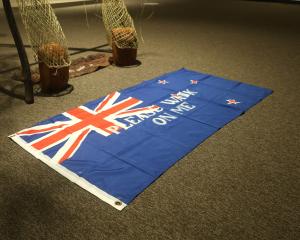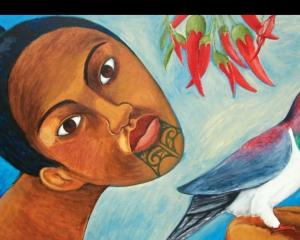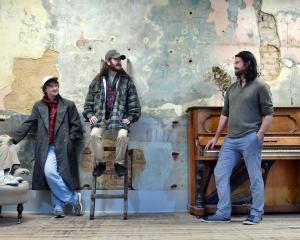The Otago Symphonic Band provides the drum roll for a unique New Zealand music celebration on Saturday.
"Black Magic" pays tribute to New Zealand Music Month with a smorgasbord of sound.
The pieces range from compositions by seasoned masters Anthony Ritchie and Peter Adams to a Chopin arrangement by 18-year-old Dunedin music student Corwin Newall.
The featured works find inspiration in such diverse subjects as Taiaroa Head, Stonehenge and 1980s video games.
"This concert represents a great commitment to New Zealand Music Month," music director Errol Moore says.
"It is exciting for players and audience to be part of a new and creative experience and it is exciting because four of the works will be world premieres."
Moore has been conducting concerts with the Dunedin Opera Company, St Kilda Brass and the Dunedin Youth Orchestra since 1983 and is an enthusiastic advocate of New Zealand works.
"Encouraging music from New Zealand also creates a sense of community amongst performers and musicians who play the music. When, in most literature, the works are from the United Kingdom or the United States the performers do not have that link," he says.
"For the composers, it is a simple recognition of their work. It is difficult achieving performance of works, particularly by professional performance groups. So, groups such as the Otago Symphonic Band perform a valuable role in getting new work into the public arena.
"Compared to most music that is available for symphonic bands, the music of New Zealand composers is a whole lot less formulaic. The pieces explore and stretch possibilities in colour and rhythm. They are full of rich tendrils of new musical thought.
"All of the pieces in the 'Black Magic' concert have a strong connection to New Zealand, place, politics, or simply the joy of living here."
Progress March, by 2010 University of Otago Mozart Fellow Chris Adams (31), is something of a protest movement.
"Progress March represents my increasing distress at the direction of the current leadership in our country," Adams says.
"In my view, the dissolution of elected representatives of Environment Canterbury, power to alter water conservation orders by government-appointed commissioners, mining of schedule 4 areas of national park, the mess that is the Auckland Supercity, potential continued attacks and underfunding of Radio New Zealand are all for short-term commercial interest. I view these as abuses by our supposedly representative politicians and all have saddened me."
Lemonland, by Alex Campbell-Hunt, references the noises of nostalgia.
"It has been written in the style of video-game music, particularly the music of late-1980s and early-1990s video games that I played in childhood," Campbell-Hunt (21) says.
"It transfers musical elements of that style to live instrumentation; particularly the use of various modes, combined with some chromaticism.
Typically of the genre, the pieces move through various different moods, corresponding to different 'stages' of the game - though the overall mood is cheerful and energetic."
Campbell-Hunt wrote his first composition as a 15-year-old Logan Park High School pupil and is now studying music at the University of Otago.
Dunedin composer, conductor and clarinettist Peter Adams looked to a landmark headland for inspiration.
"Taiaroa Head attempts to capture some of the atmosphere and features of Taiaroa Head and environs," the 51-year-old University of Otago music department lecturer says.
"Structured in a large arch, it begins with gentle clusters suggesting bleached sky, thick cloud and the play of light. A kind of refrain emerges along with a rising line in close imitation that represents sea birds taking off and following each other closely.
"High woodwind biting harmony suggests the shrieks of sea birds along with solo birds swooping downward. In the central section two themes emerge. The first eight bars of flute signals the graceful flight of albatross. The clarinet develops this with scotch snap figures and the music becomes a slow, almost wobbly, jig.
"Brass cloud refrains return and new gentle contrasting material is introduced and the mood of this section is reflective and slightly unsettled. Finally there is recapitulation of the opening sections as birds slow and glide more sedately into the clouds."
Reflections is the first work written for live performance by young Dunedin composer and oboe player Chris Geddes.
"Reflections is a symphonic poem based on two ideas or melodies," Geddes (22) says.
"The piece starts mysteriously with the first idea played in the woodwind then the brass before leaping to a faster more agitated tempo. Around halfway, a second theme emerges which becomes the conclusion to the piece.
"The title, Reflections, was chosen for two reasons: musically, the ideas are bounced around, much like reflections off a surface and, secondly, the overall mood of the piece is contemplative, as if someone was reflecting over the life they have lived," Geddes says.
Romp is the latest work by prolific University of Otago senior lecturer in composition and 1988 Mozart Fellow Anthony Ritchie (50).
"Romp is a fitting title for this music. It is an energetic piece based on one rhythmic and melodic idea with slight variations on the theme," he says.
"A slight lessening of the rhythmic tension in the latter parts prepares the listener for a robust, almost abrupt, ending featuring percussion."
An interesting piece will be an arrangement of Chopin's Fantasy Impromptu by teenage composer Corwin Newall.
"Chopin's original version of this piece is one of the most well-known solo piano pieces of its style. It also happens to be one of my all-time favourites to play," Newall (18) says.
"For my arrangements standard in level 3 music this year, I thought: 'Why don't I jazz this up?' So here is an emotionally less intense version of a fantastic work that has stood the test of time."
Newall plays the piano, saxophone and clarinet, as well as studying composition and performance piano at the University of Otago.
• Catch it
The Otago Symphonic Band presents "Black Magic" at 7.30pm on Saturday in the Otago Museum Hutton Theatre.












